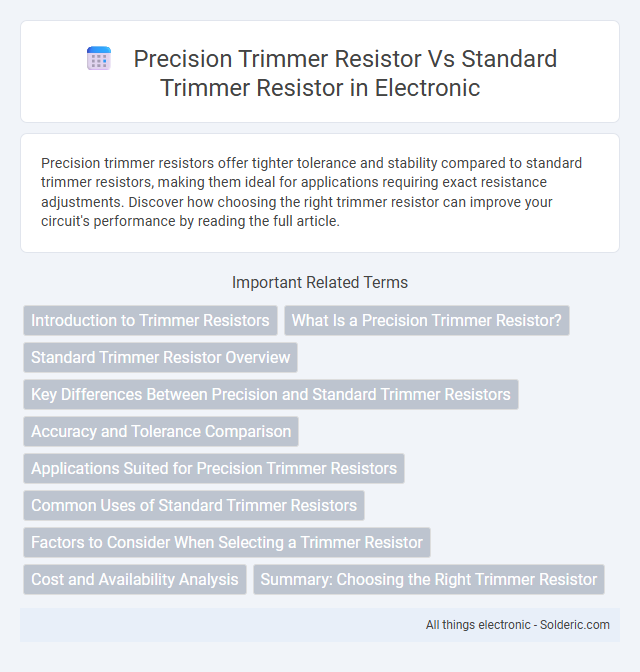Precision trimmer resistors offer tighter tolerance and stability compared to standard trimmer resistors, making them ideal for applications requiring exact resistance adjustments. Discover how choosing the right trimmer resistor can improve your circuit's performance by reading the full article.
Comparison Table
| Feature | Precision Trimmer Resistor | Standard Trimmer Resistor |
|---|---|---|
| Accuracy | High (+-0.1% to +-1%) | Moderate (+-5% to +-20%) |
| Adjustability | Fine, stable adjustments | Coarser adjustments |
| Temperature Coefficient | Low (<=50 ppm/degC) | Higher (up to 200 ppm/degC) |
| Typical Applications | Calibration, high-precision circuits | General tuning, basic adjustments |
| Cost | Higher | Lower |
| Stability | Excellent long-term stability | Moderate stability |
| Tolerance | +-0.1% to +-1% | +-5% to +-20% |
Introduction to Trimmer Resistors
Precision trimmer resistors offer enhanced accuracy and stability compared to standard trimmer resistors, making them ideal for fine-tuning circuits in sensitive electronic applications. These resistors feature tighter tolerance levels, often below 1%, and improved temperature coefficients, ensuring consistent performance under varying environmental conditions. Standard trimmer resistors are typically used in less critical adjustments where cost and simple calibration are prioritized over precision.
What Is a Precision Trimmer Resistor?
A precision trimmer resistor is a highly accurate adjustable resistor designed for fine-tuning circuit parameters with minimal tolerance, often ranging from +-0.1% to +-1%, compared to standard trimmer resistors that typically have tolerances of +-5% or higher. This component is essential in applications requiring exact calibration, such as sensor calibration, signal conditioning, and precise voltage adjustments. Your choice of a precision trimmer resistor ensures superior stability and repeatability in critical electronic circuits.
Standard Trimmer Resistor Overview
Standard trimmer resistors are adjustable components designed for fine-tuning circuit parameters with typical tolerance ranges around +-20%. They feature a simple construction suitable for general-purpose applications but lack the high accuracy and stability found in precision trimmer resistors. Commonly used in low-cost electronics, standard trimmer resistors deliver adequate performance where exact resistance values are not critical.
Key Differences Between Precision and Standard Trimmer Resistors
Precision trimmer resistors offer tighter tolerance levels, typically +-1% or better, compared to standard trimmer resistors, which often range between +-5% to +-20%. These precision components feature enhanced temperature stability and lower noise, ensuring consistent performance in sensitive electronic circuits. Standard trimmer resistors are generally used in applications where adjustments are less critical, while precision trimmers excel in calibration and fine-tuning of high-accuracy devices.
Accuracy and Tolerance Comparison
Precision trimmer resistors offer significantly tighter tolerances, often within +-1% or better, compared to standard trimmer resistors which typically range around +-10%. This enhanced accuracy ensures more reliable and stable resistance adjustments in sensitive electronic circuits. Choosing a precision trimmer resistor can improve the performance and longevity of Your device by minimizing drift and maintaining consistent settings.
Applications Suited for Precision Trimmer Resistors
Precision trimmer resistors are ideal for calibration, tuning, and fine adjustments in sensitive electronic devices such as medical instruments, RF circuits, and audio equipment due to their low tolerance and high stability. Their ability to maintain consistent resistance values over time and varying environmental conditions makes them essential in precision measurement systems and feedback loop controls. Standard trimmer resistors, with broader tolerance ranges, are better suited for general-purpose applications where exact adjustments are less critical.
Common Uses of Standard Trimmer Resistors
Standard trimmer resistors are commonly used in applications requiring adjustable resistance for calibration and fine-tuning, such as in audio equipment, power supplies, and sensor circuits. These components help optimize performance by compensating for component tolerances and environmental changes. Your circuits benefit from their stability and ease of adjustment during initial setup and maintenance tasks.
Factors to Consider When Selecting a Trimmer Resistor
When selecting a trimmer resistor, consider factors such as tolerance, stability, and temperature coefficient, which are critical for achieving precise adjustments in your circuit. Precision trimmer resistors offer tighter tolerance and better long-term stability compared to standard trimmer resistors, ensuring consistent performance in sensitive applications. Your choice should align with the desired accuracy, frequency response, and environmental conditions of the electronic design.
Cost and Availability Analysis
Precision trimmer resistors generally cost more than standard trimmer resistors due to tighter tolerance and enhanced stability, which require more rigorous manufacturing processes. Availability of precision trimmers may be limited in comparison to standard types, often necessitating special orders or longer lead times. If your application demands exact resistance adjustments, investing in precision trimmers justifies the higher cost despite potentially reduced immediate availability.
Summary: Choosing the Right Trimmer Resistor
Precision trimmer resistors offer higher accuracy and stability with tighter tolerance levels, making them ideal for fine-tuning in sensitive electronic circuits. Standard trimmer resistors provide cost-effective adjustments but may suffer from less consistency and greater drift over time. Selecting the right trimmer resistor depends on your need for precision versus budget constraints in your specific application.
precision trimmer resistor vs standard trimmer resistor Infographic

 solderic.com
solderic.com